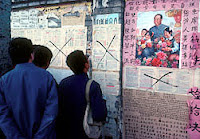Democracy Wall: A Sudden Explosion of Free Speech, 1979;Unorthodox Opinions Are Heard on the Street
by Wei Jingsheng
The outpouring of outspoken criticism could not have happened at any other time. In the early part of the 1970s, people had yet to realize how flawed the communist system was. Mao's death left a power vacuum that resulted in a loo
 sening of control by the government. In bidding for power, Deng and rival factions tried to win the people's favor by allowing a small degree of freedom. These leaders hoped, too, that freedom of speech would result in people criticizing their opponents.
sening of control by the government. In bidding for power, Deng and rival factions tried to win the people's favor by allowing a small degree of freedom. These leaders hoped, too, that freedom of speech would result in people criticizing their opponents.At first, I was optimistic. I believed that some people in the party would be open to fair criticism and that we would be allowed to continue to express our views. Within two months after the first genuinely critical essays had appeared, a real democratic opposition began to form. This group's goal wasn't merely to tinker with the system, but to declare that, without democracy, China had no future. Because of the controversy surrounding my essay, however, I realized that I would be arrested. This was disheartening, but I still believed that what I had written was right. (photo of Wei Jingsheng)


My friend, parting time is pending.
Farewell, democracy wall.
What can I say to you?
Should I speak of spring’s frigidity?
Should I say you are like the withered winter sweet?
No. I should instead talk of happiness,
tomorrow’s happiness.
Of pure orchid skies,
Of golden flowers,
Of a child’s bright eyes.
We ought to part with dignity, don’t you agree?
- an anonymously posted poem found on Democracy Wall (1978-1979)

1 comment:
Enjoyed your post Lisa and agree that having the eyes of the world on you should deter atrocities, but as you point out look at the record in Africa. I feel we haven't intervened in Africa because we don't have as large an economic stake there. Also, there is I think the issue of race;as Paul was told by the Colonel in Hotel Rwanda, no aid was forthcoming because they were black, but worse yet black African.
Post a Comment